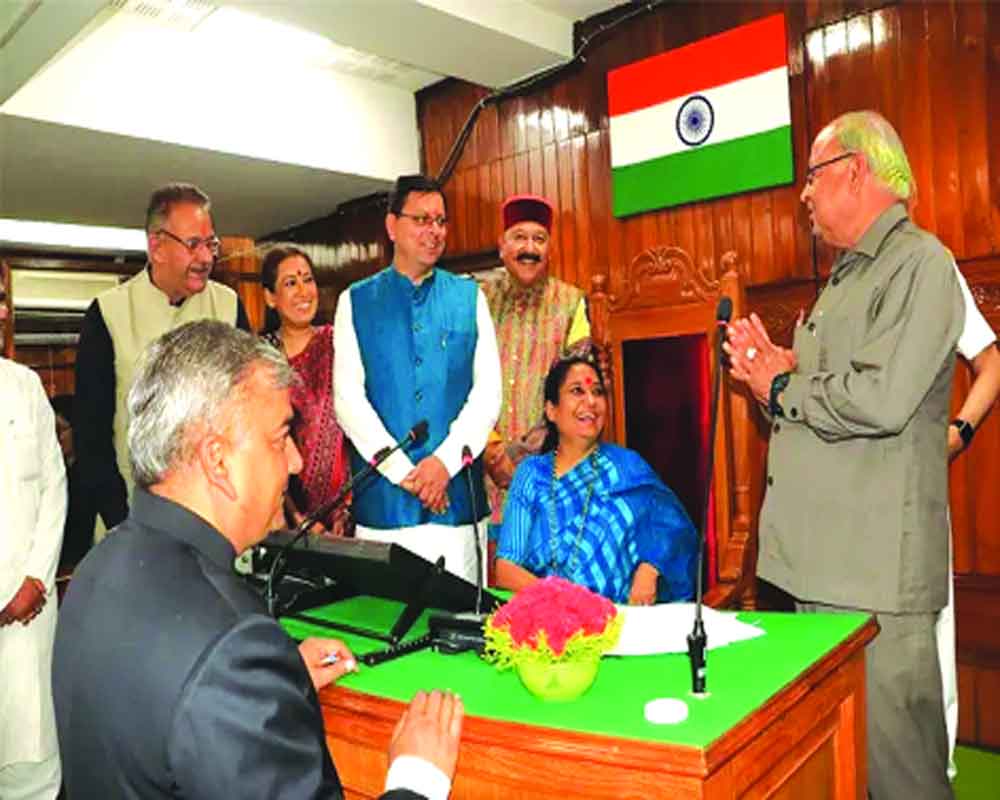Ritu Khanduri has solemnly affirmed that she will adhere to the highest standards of parliamentary practices and conventions
A pleasant surprise in Uttarakhand is the election of the first woman Speaker of the State Assembly. It is a happy augury that in male-dominated politics despite all eulogies to ‘matrishakti’ and the rhetoric of ‘gender justice’, the assembly, with barely eight women MLAs out of 70(5.6%), has elected Ritu Khanduri, a second time MLA, as the Speaker.
Khanduri has solemnly affirmed that she will adhere to the highest standards of parliamentary practices and conventions. The duties of the Speaker are many and challenging. The Speaker has to ensure that the business of the Assembly is conducted smoothly in an orderly manner. This is possible if adequate opportunities are given to the members of all sides, with especial consideration to the opposition. I recollect once there was a simmering discontent against Speaker Shivraj Patil in the Congress party as they alleged that he allowed disproportionately more time to the opposition. Shivraj Patil made it known to the Congress high command that as Speaker he was duty-bound to accommodate the opposition to uphold the neutrality of his office and the matter got buried there.
As guardian of the rights and privileges of the House, it’s Committees and the members, the Speaker must display complete neutrality, impartiality and independence. Once elected, the Speaker shuns active party politics and belongs to all sides of the House or to none. The Speakerd has “neither eyes to see, nor tongue to speak, except as the House is pleased to direct” the Speaker, as William Lenthall, Speaker of the House of Commons, famously said, way back in 1642.
As presiding officer, the Speaker has inherent regulatory powers to maintain order and decorum in the House, to give rulings and make observations which ought not be assailed inside or outside the House, such being the faith in his neutrality. Neutrality and impartiality are the hallmark of his office. Besides, the Speaker has outreach functions to foster wider conversations and engagement of the legislature with ‘the people’ -the members are elected to serve. The catalogue of the attributes of an ideal Speaker is long and demanding. Henry John Temple, British Prime Minister in the nineteenth century asked the editor of ‘The Times’, London to list the essential qualifications for speakership. The editor listed them thus -- imperturbable, good temper, tact, patience, and urbanity; a previous legal trainingif possible, absence of bitter partisanship in his previous career, the possession of innate gentlemanly feelings which involuntarily command respect and deference; and personal dignity in voice and manner’. It’s a tall order!
However, Speakers like G.V. Mavalankar, Sardar Hukum Singh, N. Neelam Sanjeeva Reddy, K.S. Hedge, Rabi Ray, Shivraj Patil and Somnath Chatterjee, Meira Kumar displayed remarkable neutrality, independence and objectivity and commanded immense respect.
Ritu Khanduri, reared and fostered in strict discipline, (being the daughter of General (Rtd.) B.C. Khanduri) and endowed with good temper, urbanity, dignity of voice and bearing, would expectedly display neutrality and nonpartisanship in her rulings and decisions, a commitment she held out on assuming the office of the Speaker. When she says, ‘Order, Order’, may there be order in the tempestuous disorderly Assembly. When members raise ‘a point of order’, may her rulings and observations and her finesse of conduct quell any doubts or misgivings. It’s a matter of grave worry that our state Assemblies hold too few a sittings and transact still lesser business due to frequent uproars and politics of obstruction. So much is spent on the conduct of elections, on the establishment of the Assembly and on the salaries and pension of the legislatures, yet the sittings are abysmally few and far between.
Debates and discussions are critically essential for the health and vigour of democracy. According to the oft-iterated resolutions of the presiding officers (POs) conferences of India, smaller assemblies should hold a minimum of sixty sittings and bigger assemblies and Parliament hundred sittings in a year with a view to securing accountability of the executive to the legislature- the cornerstone of our republican Constitution. The POs at their conference at Jaipur in 2011 recommended amendment to Articles 85 and 174 so as to make it mandatory. On an average, the Lok Sabha meets for 79 days in a year. But its valuable time is lost in uproars and obstructions and forced adjournments. It’s of course for the Union Government which could, given its successful resolve of constructing a new parliament building, hopefully bring out such an amendment as a lasting contribution to the strengthening of the edifice of our parliamentary democracy.
(The author is former Additional Secretary, Lok Sabha and a member of Delhi Bar Council. The views expressed are personal.)


























